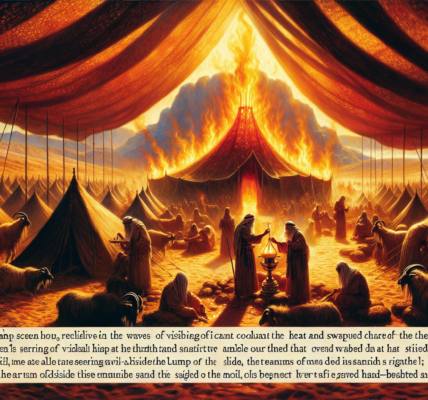In the reign of Artaxerxes the king, the families from Babylon were led by distinguished men from their respective lineages: Gershom of the sons of Phinehas, Daniel of the sons of Ithamar, Hattush of the sons of David, and others – Zechariah of the sons of Parosh, Eliehoenai the son of Zerahiah of the sons of Pahath-moab, Shecaniah the son of Jahaziel, Ebed the son of Jonathan of the sons of Adin, Jeshaiah the son of Athaliah of the sons of Elam, and so forth through the lineage of Shephatiah, Adonikam, Bigvai, and Bebai.
Together, they made their way to the river that runs to Ahava, and stayed there for three days to gather their strength for the journey that still lay ahead. There, the leader of the caravan, looked at his people, searching for the sons of Levi among his people, the priests who were to lead them in religious observance. He found none.
This apparent absence prompted him to send for distinguished men from among their number, including Eliezer, Ariel, Shemaiah, Elnathan, Jarib, and other notable members of their community who were teachers and scholars. They were tasked with journeying to Casiphia to request from Iddo, a chieftain there, ministers for the temple in Jerusalem, their ultimate destination.
The call was heeded, and they brought with them a man of understanding, Sherebiah, of the sons of Mahli, the son of Levi, the son of Israel and his sons and his brothers totaling eighteen. Hashabiah and his kin, Jeshaiah of the sons of Merari, twenty in all, also joined, as did two hundred and twenty Nethinim, servants to the Levites, all named for recognition.
Before their departure, the leader proclaimed a fast at the river Ahava, humbling themselves before God and seeking His guidance, a favorable journey for themselves, their little ones and all their belongings. They did not request for protection from the king since they had previously expressed their faith in God’s guidance and protection. They beseeched God for safety, which He graciously granted.
Twelve of the chief priests, including Sherebiah and Hashabiah, were entrusted with carrying the hefty offerings for the house of their God, which included six hundred and fifty talents of silver, silver vessels and a hundred talents of gold, twenty golden bowls each worth a thousand darics, and two precious vessels of fine bright brass.
These sacred offerings were to be protected and kept until they could be weighed before the chiefs of the priests and the Levites and the aristocracy of Israel in the chambers of the house of God in Jerusalem. Thus, the priests and the Levites took on this grave responsibility.
With the hand of God upon them, they journeyed on, departing from the river of Ahava, and He kept them safe from any adversary that might seek to harm them on their journey. When they arrived in Jerusalem, they rested for three days.
On the fourth day, the silver, gold, and vessels were weighed in the house of their God, recorded by Meremoth the son of Uriah the priest, and by Eleazar the son of Phinehas, with Jozabad the son of Jeshua and Noadiah the son of Binnui, the Levite. This sacred accounting was not informal or casual: each item was counted, each weight carefully recorded.
They who had returned from captivity, now on their native soil again, offered sacred burnt-offerings unto the God of Israel. This act of devotion and faith was a glorious burnt-offering to Jehovah. As everything fell into place, they let the king’s officials, even the governors beyond the River know of their return and their dedication to rebuilding the house of their God. These officials supported their cause and fostered the people and the house of God.



